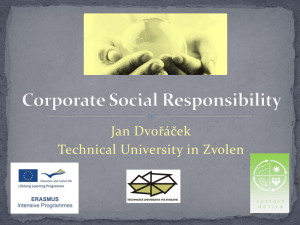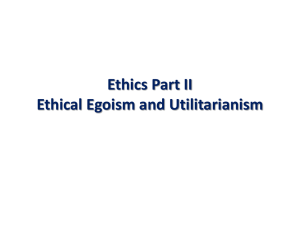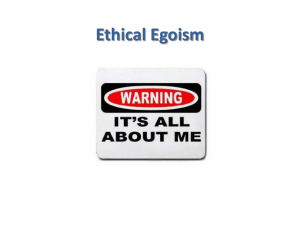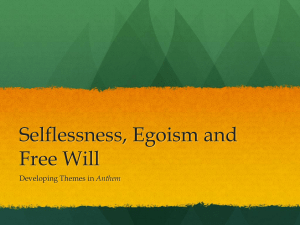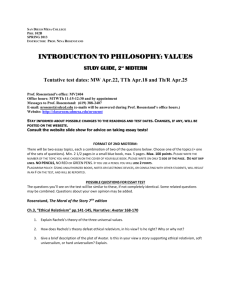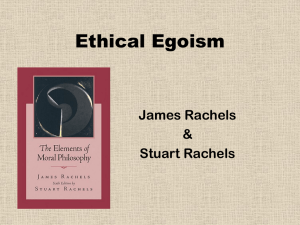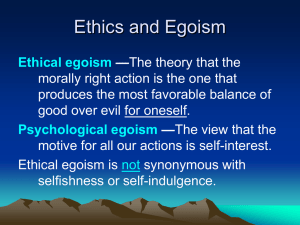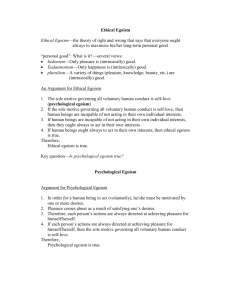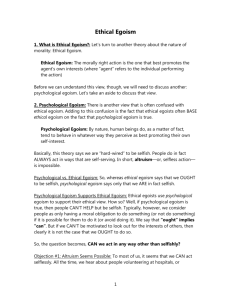File - Leadership Project and Capstone
advertisement
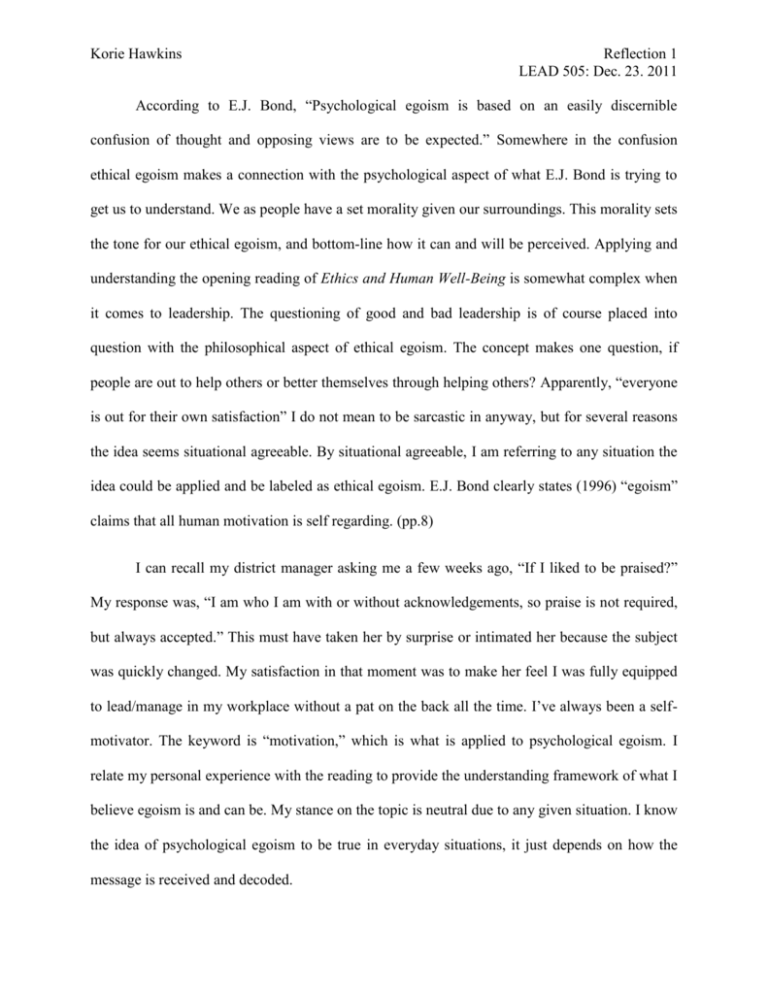
Korie Hawkins Reflection 1 LEAD 505: Dec. 23. 2011 According to E.J. Bond, “Psychological egoism is based on an easily discernible confusion of thought and opposing views are to be expected.” Somewhere in the confusion ethical egoism makes a connection with the psychological aspect of what E.J. Bond is trying to get us to understand. We as people have a set morality given our surroundings. This morality sets the tone for our ethical egoism, and bottom-line how it can and will be perceived. Applying and understanding the opening reading of Ethics and Human Well-Being is somewhat complex when it comes to leadership. The questioning of good and bad leadership is of course placed into question with the philosophical aspect of ethical egoism. The concept makes one question, if people are out to help others or better themselves through helping others? Apparently, “everyone is out for their own satisfaction” I do not mean to be sarcastic in anyway, but for several reasons the idea seems situational agreeable. By situational agreeable, I am referring to any situation the idea could be applied and be labeled as ethical egoism. E.J. Bond clearly states (1996) “egoism” claims that all human motivation is self regarding. (pp.8) I can recall my district manager asking me a few weeks ago, “If I liked to be praised?” My response was, “I am who I am with or without acknowledgements, so praise is not required, but always accepted.” This must have taken her by surprise or intimated her because the subject was quickly changed. My satisfaction in that moment was to make her feel I was fully equipped to lead/manage in my workplace without a pat on the back all the time. I’ve always been a selfmotivator. The keyword is “motivation,” which is what is applied to psychological egoism. I relate my personal experience with the reading to provide the understanding framework of what I believe egoism is and can be. My stance on the topic is neutral due to any given situation. I know the idea of psychological egoism to be true in everyday situations, it just depends on how the message is received and decoded. Korie Hawkins Reflection 2 LEAD 505: Dec. 23. 2011 In my search for relatively related material to E.J. Bond ideas, I found an article in The Journal of Philosophy: Ethical Egoism and Rational Action. The article pinpoints one author challenging another in this case Nielsen vs. Brandt. The key component I pulled from the article was the overall concept, Nielsen (1972) “We cannot simply assume that a rational man will be a principled man, though a rational man will see the value of principled behavior in society.” (pp.700) Meaning in any given situation we can’t expect for man to consider his actions and how they affect other people, but we can expect for him to make the best decision based on his overall intelligence. This decision involves ethical egoism, rather purposeful or not his overall judgment will lead to satisfaction in some way. I also found an article in Philosophy and Phenomenological Research: Ethical Egoism and Social Welfare. The primary purpose of the article revolves around “ethical egoist principle distribution of praise and blame at a vast array and proclaiming the adopted social effects would be all and all natural,” according to Robert G. Olsen. My understanding of the article is that we as people urge the consideration of other humans. Humans thrive off of gaining respect, and providing mutual respect, Olsen (1961) “thus creating conditions which favor a reasonable and cooperative endeavor to compromise differing interests and disposing the agent to regard moral rules designed to promote the general welfare with greater sympathy.”(pp.532) Humans do this so that our overall surroundings aren’t compromised and ending satisfactions are fulfilled either way majority of the time. Opening the initial reading by E.J. Bond thoughts of disturbance of whole heartedness grew inside of me. The mere principle of ethical egoism is based on self-regarding and understanding the overall concept is fascinating. My conclusive viewpoint is neutral based off the knowledge I have gained thus far. Our acts as humans are simply made to put us at an Korie Hawkins Reflection 3 LEAD 505: Dec. 23. 2011 advantage against one another. Ethical egoism revolves around motivation and domination, utilizing it can only be based off one’s morality. Korie; you have some real gems in the analysis from your personal experience. I appreciate the answer that you gave your supervisor. I think you will need to work on style and substance in writing these smaller papers. Shoot for concision with accuracy. If a phrase or sentence seems irrelevant – it probably is. If you weed out some of that stuff, it will make more room for you to deal with the substance of the articles that you read. 95% Korie Hawkins Reflection 4 LEAD 505: Dec. 23. 2011 References Bond, E. (1996). Ethics and Human Well-Being. Cambridge: Blackwell Publishers. Nielsen, K. (1972). Ethical Egoism and Rational Action. The journal of Philosophy , 698-700. Olsen, R. G. (1961). Ethical Egoism and Social Welfare. Philosophy and Phenomenological Research , 528-536.
